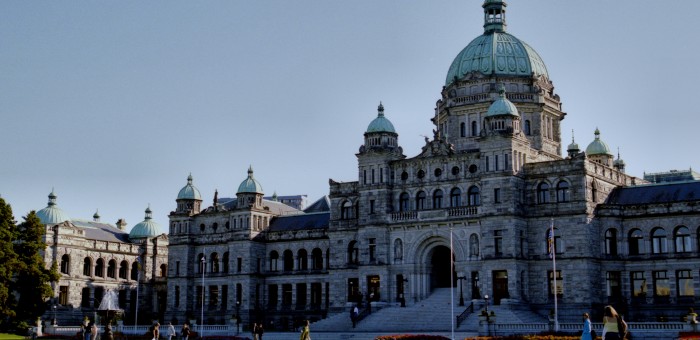Issues & Community Blog - Andrew Weaver: A Climate for Hope - Page 108
Comments on Vancouver School Board Firing
For immediate release
Oct. 17, 2016
Weaver Comments on Vancouver School Board Firing
Victoria, B.C. – “For public education to thrive in British Columbia, the provincial government must work effectively and in partnership with Boards of Education to put students first,” said Andrew Weaver, leader of the B.C. Green Party and MLA for Oak Bay-Gordon Head. “Minister Bernier’s announcement today is yet another example of how the dysfunctional relationship between the B.C. Liberals and Boards of Education results in the spending of more time and money on opposing each other than on finding solutions that will benefit students and teachers in the classroom.”
“We need to build relationships that establish trust. Education in B.C. needs a fresh start. The B.C. Greens are committed to working collectively with all stakeholders to make public education a priority and put the interests of BC students first.”
“With the cancelling of the fall Legislative session, this major decision was made without parliamentary oversight, allowing the B.C. Liberals to avoid being held accountable for their continued mismanagement of our public education system.”
– 30 –
Media contact
Mat Wright
Press Secretary
Office of Andrew Weaver, MLA
+1 250-216-3382
Apply for the 2016 BC Youth Parliament
The 88th British Columbia Youth Parliament will hold its parliamentary session in Victoria at the Provincial Legislative Chambers from December 27 to 31, 2016. The Youth Parliament is a province-wide non-partisan organization for young people ages 16 to 21. It teaches citizenship skills through participation in the December parliamentary session and in community service activities throughout the year. Youth Parliament is a one year commitment.
The BC Youth Parliament is non-partisan and applicants need only be interested in learning more about the parliamentary process and in serving their community.
The application is available here, along with an informational brochure and poster.
All applications must be received by October 27, 2016. Selected applicants will be notified in early November.
For more information, please click here.
Taking aim at corporate and union donations
Last week I had the honour of addressing the Union of B.C. Municipalities at their annual convention. This is a condensed version of my speech as published in the Saanich News. It highlights one of our most important policy announcements to date:
The last time I stood before you was in 2013, shortly after I was elected as the MLA for Oak Bay Gordon Head. Now I stand before you as the leader of the B.C. Green Party, a party that has grown dramatically over the last few years – a party that is ready and excitedly awaiting the 2017 provincial election.
Politics wasn’t originally in my career plan. I was a Canada Research Chair at the University of Victoria working in the field of climate science.
Anyone who has attended a public lecture or class that I have given on the topic of global warming will know that I boil the entire issue down to one question.
Do we the present generation owe anything to future generations in terms of the quality of the environment that we leave behind?
It’s a complex question that science cannot answer. But if we do believe that the answer is yes, then we have absolutely no choice but to take action now.
To the same classes and lectures I note that our political leaders do not have to live the long-term consequences of the decisions that they do or don’t make. Yet these very same decisions will have a profound effect on the type of world we leave behind to our children.
I tell the young adults in the audience that it is critical they participate in our democratic institutions and say, “if there are no politicians willing to tackle those problems, you should consider running yourself.”
Eventually, I knew I couldn’t keep doling out that advice if I was not willing to follow it myself.
I care deeply about my community and wanted to do what I could to better it for present and future generations.
But where do we go from here? In the shadows of the massive challenges that we face, our province needs new leadership.
Our government must start thinking about the long-term consequences of our decisions, decisions that put people, rather than vested corporate or union interests or re-election goals first and foremost.
Leaders must have the courage to be honest with British Columbians about the risks and consequences of any government decision.
We need leadership that offers a realistic and achievable vision grounded in hope and real change.
We need leadership that places the interests of the people of British Columbia – not organized union or corporate interests – first and foremost in decision-making.
As a start, political parties must stop accepting corporate and union donations.
Our political parties and their MLAs should not be reduced to puppets controlled by corporate or union masters with a firm grip on their purse strings.
The acceptance of this practice is undermining every sector in our province and I am tired of waiting for the B.C. government to do something about it.
I am tired of listening to the official opposition say they will change the system only if they form government. That’s not leadership.
Leadership means leading by example.
Effective immediately, the B.C. Green Party will no longer accept any corporate or union donations.
We are a party of the people, for the people and that will be mirrored in our funding structure.
Could this move hurt us on the eve of an election? Yes, it could. But real leadership doesn’t come from doing what is easy. It is built on doing what is right.
Let’s explore the concept of basic income: Please let me know what you think
Over the next few weeks I will explore the concept of “Basic Income”. I would be most grateful if you would share your comments, suggestions and concerns with me about this topic as we unpack what it all means in a series of upcoming posts. In this first post we simply provide a backgrounder.
1. What is “Basic Income”?
A basic income is a regular payment that the Government makes to individuals or families in its jurisdiction, which is not contingent on recipients fulfilling specific criteria (e.g. proving that they are active job seekers).
Basic income comes in two basic forms: means-tested and universal. In its means-tested form, a basic income is paid only to those whose income from other sources falls below a predetermined threshold, but is not contingent on recipients’ willingness to work. It is often referred to as “guaranteed minimum income”. In its universal form, a basic income is paid to all, irrespective of income from other sources. The unconditional basic income is often referred to as “universal basic income” or a “citizen’s’ wage”.
The idea of a basic income has become more popular recently, and has garnered support from across the political spectrum. In Canada, Ontario is planning a pilot next year, and Quebec, Alberta, and PEI have also raised the possibility of running pilots in the near future. Internationally, Finland and the Netherlands are both staging large-scale pilots in 2017.
2. Background
a. Poverty and Inequality in BC
The levels of poverty and inequality in BC are high relative to the national average. BC has higher than average rates of poverty, with poverty rates up to 16% and child poverty rates up to 20%, depending on the poverty measure used. BC also has one of the highest levels of inequality in Canada, estimated to be second only to Alberta.
For those needing support, our current system of social programs has a number of shortcomings. The siloed approach, with a myriad of different programs with specific eligibility criteria, allows people to slip through the cracks in the system and leaves many unsure which benefits they are eligible for. It also has a substantial administrative cost. There is significant stigma in collecting welfare today, and many argue that the invasiveness of the current approach, with its stringent conditionality and reporting requirements, strips recipients of privacy and dignity. Additionally, the current system may provide a disincentive for many to join the workforce, due to how quickly the benefits are reduced as any income is earned.
b. A Shifting Economy
Unprecedented technological advance, of rapidly increasing pace, is set to have a significantly disruptive effect on our economy. To now, we have seen deindustrialization and the closure of industries, together with a boom and bust economy in British Columbia that almost defines much of provincial economic history. With increasing automation, forecasts suggest the potential for the rapid elimination of jobs across a wide range of sectors. Automated voice recognition software is already replacing many call centre workers, car assembly plants use more robots than people, and driverless cars and trucks are already significantly impacting the taxi and trucking industries. The effects of automation are predicted to be most strongly felt in moderate and low-paying jobs: Barack Obama’s 2016 economic report predicted that jobs paying less than USD$20/hour face an 83% likelihood of being automated, while jobs paying between $20 and $40/hour face a 33% chance. In the UK, one third of retail jobs are forecasted to be replaced by 2025. The effects of automation are predicted to spread to higher paying professional sectors as well, particularly the medical and legal professions. Technological advance has been attributed as a cause of increasing inequality by a number of economists because of automation’s effects on jobs and technology’s role in further concentrating the accumulation of wealth in the hands of top earners.
We are also heading toward what is commonly termed the ‘gig’ economy. We are shifting away from the 20th century model of permanent full-time work with benefits toward precarious contract-based work, which is spreading at an increasing rate to workers at all levels of education, trade, skill and profession. Contract-based employment means employers, with an expanding labour pool, can negotiate pay, usually with few or no benefits, outside of union negotiated packages. Examples today include Uber drivers, health care assistants, and sessional lecturers at postsecondary institutions.
3. Potential Effects of a Basic Income: Opportunities and Challenges
Perhaps the most transformational promise of a basic income is its potential to raise recipients out of poverty. Living in poverty takes a significant toll, and the elevated levels of stress that it brings are associated with higher levels of alcohol and drug abuse, domestic abuse, and mental health problems. Those living in poverty are more likely to have inadequate nutrition, use tobacco, be overweight or obese, and be physically inactive. The adverse effects of growing up in poverty on a child’s ability to be successful in school and integrate into the workforce contribute to generational poverty.
The moral case for tackling poverty is self-evident: doing so would have a life-changing effect on the lives of those currently living in poverty and dealing with the problems it brings on a daily basis. The financial cost is also significant: the adverse outcomes of poverty lead to increased use of public health care, more hospitalizations, and lost economic activity, among other effects.
A pilot project undertaken in Manitoba in the 1970s suggests that a basic income policy can have significant impacts on the healthcare system: providing a basic income to residents of Dauphin, Manitoba for 3 years reduced hospital visits by 8.5%. The decrease in hospital visits was attributed to lower levels of stress in low income families, which resulted in lower rates of alcohol and drug use, lower levels of domestic abuse, fewer car accidents, and lower levels of hospitalization for mental health issues.
A basic income could also provide a means to respond proactively to the changes we are just beginning to see in the labour market. As the effects of automation are realized, providing a basic income would enable those affected to retrain for new professions, attend or return to University or College, take entrepreneurial risks, contribute to their communities or other causes through volunteering and civic engagement, and invest time in their families.
A challenge in considering a basic income scheme is predicting its effects on the labour market, specifically the extent to which it might provide a disincentive to work comparable to or stronger than the disincentive often associated with our current social assistance programs. The Dauphin, Manitoba pilot study provides some initial information on this question: it was found that the negative effect on people’s willingness to work was minimal for the general population, but more pronounced for mothers with young children, and teenagers aged 16-18 who completed high school instead of leaving to join the workforce.
A recent report by the Vancouver Foundation advocates paying all youth ages 18-24 transitioning out of foster care a “basic support fund” of between $15,000-$20,000. Doing so, they estimate, would cost $57 million per year, whereas the cost of the status quo is between $222-$268 million per year, due to the range of adverse outcomes that affect youth in transition, including intergenerational poverty, criminal activity, substance abuse, lost educational opportunities, and homelessness. Thus they estimate that establishing a basic support fund for youth in transition would result in savings to the Provincial Government of $165-$201 million per year.
The cost of a basic income program is difficult to predict, and estimates range widely according to assumptions made about the characteristics of the program and its social and economic effects. In costing a basic income it is important not to ignore the cost of the status quo: the direct costs of unemployment, poverty, and homelessness as well as the costs of managing the adverse effects. Nonetheless, the cost of a basic income program to BC is potentially significant, and costs associated with different implementation options must be fully worked out and tested.
4. So what are your thoughts?
While I recognize that I’ve only provided cursory information to initiate this conversation, I would like to hear your thoughts on the idea of a basic income. Do you think a basic income policy holds promise as a potential way forward in BC, allowing us to tackle poverty effectively and prepare for a future in which the nature of work is vastly different from what we have known in the past? What are your concerns about the policy? How would you like to see it implemented? Thank you in advance for your comments.
National Carbon Price a Welcome start
Media Statement: October 3, 2016
National Carbon Price a Welcome start: Andrew Weaver MLA
For immediate release
Victoria B.C. and Ottawa, Ontario – The announcement of a national price on carbon is a welcome start says Andrew Weaver, MLA for Oak Bay-Gordon Head and Leader of the B.C. Green Party.
The federal government announced today a carbon pricing scheme starting at $10 per tonne beginning in 2018, rising by $10 annually to $50 per tonne in 2022. Provinces and territories can choose a direct carbon tax, or a cap-and-trade model as long as greenhouse gas reduction targets are met.
“The national carbon price is an encouraging start to have all of Canada on a program to meet the commitments we signed under the Paris agreement.” says Andrew Weaver, “This plan also ensures any revenue collected remains in the provinces and territories allowing each jurisdiction flexibility on investments or tax relief.”
“Beyond a national carbon price what we need is federal investment to encourage all regions of Canada to move from a carbon intensive to a carbon neutral economy. That can, and should, involve many sectors like energy, transportation and construction. The opportunity now is to demonstrate national and international leadership from all levels of government. As leader of the B.C. Green Party my commitment is to ensure British Columbia is at the forefront of the transition to a 21st century economy.
“While this is a big step forward for Canada, the reality is that $10 per tonne is not enough to change behaviour. British Columbia should develop its own aggressive timeline for increases to its carbon tax. The effectiveness of our tax has been greatly reduced by not increasing it, as both Climate Leadership Teams recommended. British Columbia needs to make the pricing of carbon a centerpiece of our approach to economic development in order to properly and adequately address climate change.”
Andrew Weaver was on Parliament Hill in Ottawa, Ontario for the announcement today.
Media Contact:
Mat Wright
Press Secretary – Andrew Weaver MLA
1 250 216 3382
mat.wright@leg.bc.ca







